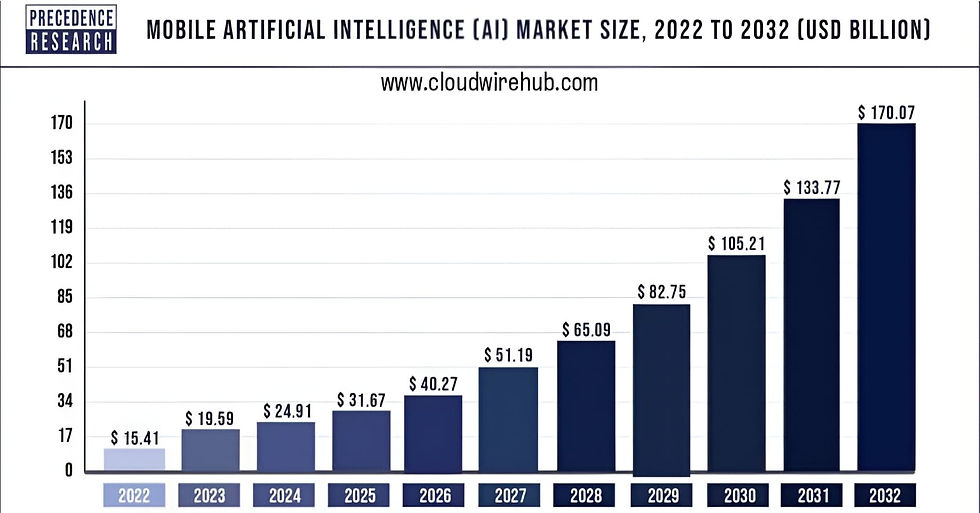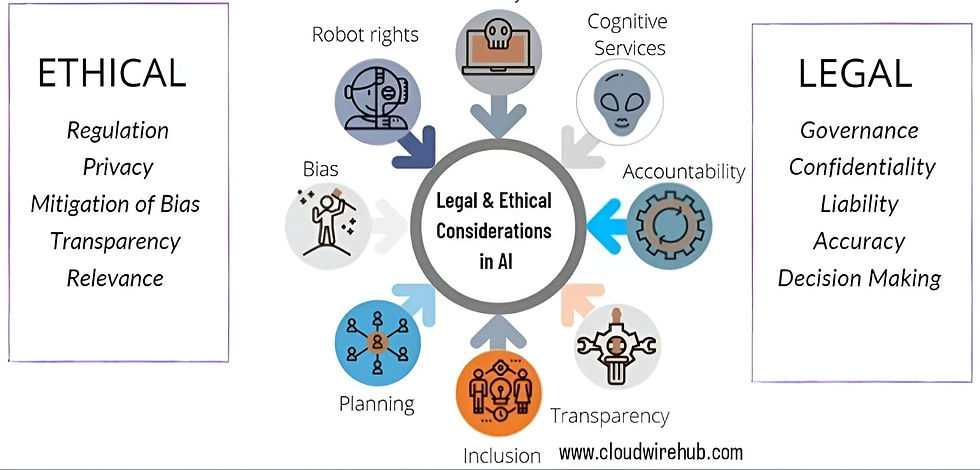AI Search Transformation: The End of Traditional Search Engines?
- Shashank Mishra
- Mar 23
- 4 min read
Search engines have been the backbone of the internet, shaping how users access and interact with information. However, artificial intelligence (AI) is fundamentally transforming traditional search models, particularly disrupting Google’s long-standing "ten blue links" approach. AI-driven search tools provide more intuitive, contextual, and personalized experiences, marking a significant shift in how users engage with online information.
The Evolution of AI Search

AI search usage surged by 1,950% during Cyber Monday 2024, as reported by Adobe Analytics.
Traditional search engines like Google and Bing have relied on algorithms that rank web pages based on factors such as relevance, backlinks, and keywords. While this model has been effective for decades, the emergence of AI-powered search tools has introduced more sophisticated ways to deliver results. AI search leverages natural language processing (NLP), machine learning (ML), and large language models (LLMs) to provide answers in a conversational and highly personalized manner.
Key Differentiators of AI-Powered Search
Contextual Understanding – AI search engines analyze user queries in-depth, understanding context rather than relying solely on keyword matching.
Conversational Interactions – Unlike traditional search engines, AI search tools can engage in dialogue, refining responses based on follow-up questions.
Personalized Results – AI learns from user behavior, preferences, and past searches to deliver more relevant results.
Multi-Modal Search Capabilities – AI search integrates voice, text, and image recognition to provide a seamless search experience.
Real-Time Data Processing – AI tools can generate responses using live data, ensuring users receive the most up-to-date information.
The Rise of AI Search in User Engagement

Traditional search click-through rates (CTR) have declined as AI models provide direct answers instead of listing multiple links.
According to Adobe’s research, AI search usage has skyrocketed, particularly during high-traffic events like Cyber Monday 2024. The report highlights a 1,950 percent increase in referrals from AI-powered search tools, indicating that users are shifting away from conventional search engines.
AI Search vs. Traditional Search: Engagement Metrics
Longer Session Durations – Users spend more time interacting with AI search results, indicating a higher level of engagement.
Lower Bounce Rates – AI-powered search retains users better by providing more accurate and useful information upfront.
Higher Page Views Per Session – Users explore more related topics and engage deeper within websites recommended by AI search.
How AI Search is Disrupting Google’s Traditional Model
Google’s "ten blue links" model has dominated search for over two decades. This model presents users with a ranked list of website links, leaving them to determine which source best fits their query. However, AI search tools are challenging this structure by eliminating the need for multiple clicks and providing direct answers instead of simple links.
AI’s Direct Answering Approach
Conversational AI (e.g., ChatGPT, Bard) – Instead of listing multiple sources, AI-powered search tools summarize key points from numerous pages into a single, coherent answer.
AI-Powered Assistants (e.g., Perplexity, Bing Chat) – Users can refine queries instantly, avoiding repetitive searches.
Smart Summarization and Analysis – AI search engines synthesize insights from multiple sources, eliminating redundant content.
This shift could significantly reduce organic traffic to traditional websites, prompting digital marketers and content creators to adapt their SEO strategies for AI-generated answers.
Industries Benefiting from AI Search
AI-driven search tools are revolutionizing multiple industries by enhancing search efficiency and delivering actionable insights. Some of the key industries benefiting from this transformation include:
1. E-Commerce
Retailers use AI search to personalize product recommendations, improving the shopping experience. Platforms like Amazon and Shopify utilize AI to refine search results based on user behavior.
2. Healthcare
Medical professionals and patients benefit from AI search by accessing accurate, real-time health information and AI-assisted diagnosis tools.
3. Finance
AI-powered search tools help investors and analysts track market trends, stock performance, and economic forecasts more effectively than traditional search engines.
4. Education
AI search enhances e-learning platforms, providing contextual answers, study guides, and research materials tailored to individual learning needs.
Challenges and Ethical Considerations

Google, Microsoft, and startups like Perplexity AI are investing billions in AI-powered search models to stay ahead.
Despite its advantages, AI search introduces new challenges and ethical concerns that must be addressed:
Bias in AI Models – AI search tools can inherit biases present in training data, potentially skewing search results.
Lack of Source Transparency – Unlike traditional search engines that display source links, AI search may provide summarized answers without clear citations.
Impact on Digital Advertising – As users rely on AI-generated responses, traditional search advertising models could face disruptions.
Data Privacy Risks – AI search tools collect user data for personalization, raising concerns over data security and consent.
The Future of AI Search

AI search engines reduce bounce rates and increase user engagement, with visitors staying longer on AI-driven results pages.
As AI-powered search continues to evolve, its future trajectory includes:
Greater Integration with Voice Search – AI-driven search assistants like Siri, Alexa, and Google Assistant will become more sophisticated in handling natural language queries.
Improved Multimodal Search – AI search will seamlessly integrate text, voice, and images for more dynamic search experiences.
Expansion in Enterprise Search – Businesses will leverage AI search to streamline internal knowledge management and decision-making processes.
Hybrid Models – Future search engines may combine traditional ranking algorithms with AI-powered conversational interfaces to enhance accuracy and reliability.
Final Thoughts
AI-driven search is redefining how users interact with information, marking a shift from the traditional “ten blue links” model to contextual, AI-generated responses. The rise of AI search has led to increased engagement, higher retention, and more personalized user experiences. However, as this technology advances, businesses and digital marketers must adapt their SEO and content strategies to remain visible in AI-driven search ecosystems.
While Google’s traditional search model remains dominant, the rapid evolution of AI search tools indicates that the future of search will be highly interactive, intelligent, and personalized. Organizations and individuals must embrace AI search technology to stay ahead in this transformative digital era.



Comments